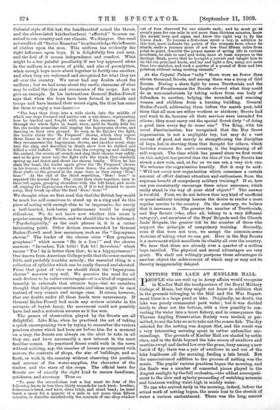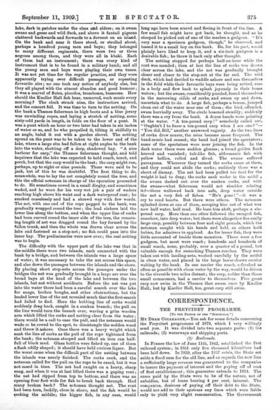NETTING THE LAKE AT KNELLER HALL.
PEOPLE who are well up in Army affairs would recognise in Kneller Hall the headquarters of the Royal Military College of Music, but they might not know in addition that in the grounds belonging to the 7'N11 and the War Depart- ment there is a large pond or lake. Originally, no doubt, the lake was purely ornamental park water ; but it was decided lately to clear out the bottom; with a view possibly to con- verting the water into a trout fishery, and in consequence the Themes Angling Preservation Society were invited, or per- mitted, to net the lake so as to take but the coarse fish. The day selected for the netting was August 31st; and the. result was a very interesting morning spent in rather unfamiliar sm.- rouncrmgs. The grounds of Kneller Hall are shaded by noble elms, and in the fields beyond the like scores of swallows and martins swept and darted low over the grass, busy among a new hatch of fly; there was a pair of swallows in and out of the lake boathouse all the morning, feeding a late brood. Bit the unaccustomed addition to the process of netting was the music. The pupils' various practices began the morning, and the finale was a number of concerted pieces ,plaYed in the August sunlight by the full orchestraithe oddest aecompani- • :tent to the slow and splashy proceeding of watching netamen and boatmen. wading waist-high in Muddy water.
To one who arrived early in the morning, indeed, before the actual work of netting began, the music lent to the stretch:of water i''curious enchantment. There was the long, narrow lake, dark in patches under the elms tad alders; on it swam swans and geese and wild duck, and above it fantail pigeons clattered backwards and forwards to a dovecot on an island. On the bank and near it there stood, or strolled about, perhaps a hundred yoUng men and boys ; they belonged to many different regiments, there were two or three negroea among them, and they were all in khaki. Each of them had an instrument; there was every kind of instrument that is to be found in a military band; and all the young men and boys were playiiag their own tunes. It was not yet, time for the regular practice, and they were apparently trying over difficult passages, or repeating favourite airs ; no one took any notice of anybody else, but they all played with the utmost abandon and good humour ; it was a marvel of flutes, piccolos, trombones, bassoons. How should the limner Hall fish hear, unmoved, such music every morning P The clock struck nine, the instructors arrived, and the concert fell. It was time to turn to the netting. On the bank a Thames fisherman in high boots and a blue jersey was unwinding ropes, and laying a stretch of netting, some sixty-odd yards in length, in folds on the floor of a punt. It was a punt which an hour or two later had taken in six inches of water or so, and he who propelled it, tilting it skilfully to an angle, baled it out with a garden shovel. The netting spread on the punt was to be taken to the lower end of the lake, where a large elm had fallen at right angles to the bank into the water, shutting off a deep, shadowed bay. "A nice harbour for carp," the Thames fisherman thought, and told inquirers that the lake was expected to hold roach, tench, and perch, but that the carp would be the best; the carp might run, perhaps, up to eight or nine pounds. There were said to be jack, but of this he was doubtful. The first thing to do, meanwhile, was to lay the net completely round the tree, and this the official netsman in charge of the operation proceeded to do. He sometimes rowed in a small dinghy, and sometimes waded, and he wore for his very wet job a pair of waders reaching high above his waist and a dark waterproof coat ; he smoked ceaselessly and had a .shrewd way with few words. The net, with one end of the rope pegged to the bank, was gradually wrapped round the tree ; the lead sinkers laid the lower line along the bottom, and when the upper line of corks had been curved round the inner side of the tree, the remain- ing length of net was dragged round the bay formed by the fallen trunk, and then the whole was drawn clear across the lake and fastened as a stop-net ; no fish could pass into the inner bay. The preliminaries were now over ; the real netting was to begin.
The difficulty with the upper part of the lake was that in the middle there were two islands, each connected with the bank by a bridge, and between the islands was a large space of water; it was necessary to take the net across this space, and also down the passages between the islands and the shore. By placing short stop-nets across the passages under the bridges the net was gradually brought in a large are over the broad bays at the head of the lake and between the two islands, but not without accidents. Before the net was put into the water there had been a careful search over the lake for snags, broken boughs, and other obstructions, but the leaded lower line of the net revealed much that the first search had failed to find. Here the bobbing line of corks would suddenly drag back, caught in a sunken branch; the pull on the line would turn the branch over, waving a grim wooden arm which lifted the corks and netting clear from the water ; there would be a call to ease the pull, and the netsman would wade o: be rowed to the spot, to disentangle the sodden wood and throw it ashore. Once there was a heavy weight which sank the line of corks as the pull of the rope tightened from the bank; the netsman stooped and lifted an iron can half- full of black mud. Glass bottles were fished up, one of them a flask oddly shaped ; it should have held curious liquor. But the worst came when the difficult part of the netting between the islands was nearly finished. The corks sank, and the netsman called for the pull on the rope to be eased, but it was not eased in time. The net had caught ou a heavy, sharp snag, and when it was at last lifted there was a gaping rent ; the net had ripped from top to bottom, and there was an opening four feet wide for fish to break back through. Had many broken back? The netsman thought not. The rent had been torn, luckily, close in shore, and the fish would be seeking the middle; the bigger fish, in any case, would
long ago have been scared and fleeing in front of the line. A few small fish might have got back, he thought, and as he stooped he picked out of one of the meshes a gudgeon. "It's very near a specimen gudgeon, though," he observed, and tossed it to a small boy on the bank. He, for his part, would plainly have liked to keep it, and a six-inch gudgeon is a. desirable fish ; he threw it back only after thought.
The netting stopped for perhaps half-an-hour while the rent was mended ; then at last the line of corks was drawn clear across the lake, and the net was gradually brought closer and closer to the stop-net at the far end. The wild duck, which had decided to waddle ashore and sun themselves in the field while their favourite bays were being netted, rose in a body and flew back to splash joyously in their home waters ; but the swans, considerably puzzled, found themselves in the narrowing circle of corks, and swam up and down, uncertain what to do. A large fish, perhaps a bream, jumped clean out of the water near one of them ; the bird, offended, swam hurriedly away. The circle lessened steadily; suddenly there was a cry from the bank. A dozen hands were pointing at the water. " A ten-pound carp !" somebody called out. "Oughtn't I to know a ten-pound carp when I see one? "— " You did, Bill," another answered vaguely. As the two lines of corks drew nearer, the cries became more frequent. The band-music bad ceased ; the band had joined the spectators ; some of the spectators were near joining the fish. In the dark water there were sudden gleams ; a broad golden flank heaved and vanished ; tub-like fish, aldermanic fish with yellow bellies, rolled and dived. The swans suffered paroxysms. Wherever they turned the corks came at them, and they could not abide the corks ; suddenly there was a shout of dismay. The net had been pulled too taut for the weight it had to drag; the corks sank under in the rniddl the swans dashed out over the sunken corks, and with the swans—what fisherman would not shudder relating it-?—there wallowed back into safe, deep water outside the net a very fish of fishes. "He's gone ! "—it was a. cry to read hearts. But there were others. The netsman splashed down at one of them, scooping him out of what was now half water, half mud. He bore him aloft, perhaps a six- pound carp. More than one other followed the escaped fish, somehow, into deep water; but there were altogether five really large carp, possibly between four and eight pounds, which the netsman caught with his hands and held, as others hold babies, for admirers to applaud. As for lesser fish, they were little accounted of .beside these monsters. There were a few gudgeon, but most were roach ; hundreds and hundreds of small roach, none, probably, over a quarter of a pound, but valuable enough for restocking Thames reaches. They were taken out with landing-nets, washed carefully by the netful in clean water, and placed in the large horse-drawn carrier waiting by the bank. In one carrier the roach, refreshed as often as possible with clean water by the way, would be driven to the riverside two miles distant ; the carp, nobler than those small commoners, had a carrier to themselves. Five great carp now swim in the Thames that swam once by Kneller Hall; but by Midler Hall, too, great carp still swim.







































 Previous page
Previous page